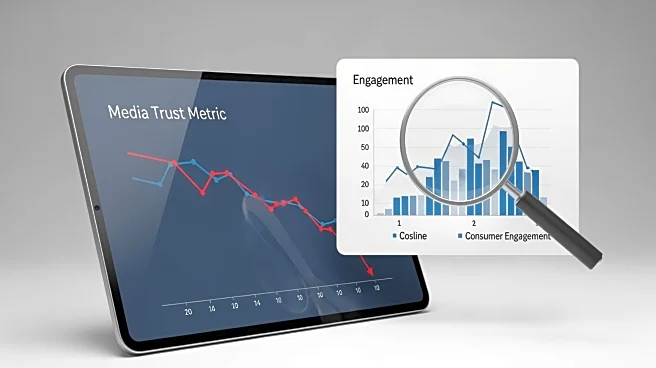What's Happening?
Recent data from Kantar's Media Reactions study highlights a significant decline in media trust metrics among marketers and consumers. The study reveals that only 29% of consumers perceive advertisements
as innovative, a figure that drops to 14% among marketers. This decline in trust is compounded by a decrease in confidence regarding cross-screen integration, which has fallen from 89% in 2017 to 64% in 2025. The survey also indicates that 69% of consumers struggle to differentiate truth from disinformation in media, while 66% express concerns about personal data usage. Additionally, 75% of consumers prefer human interaction over AI or digital interfaces. These findings underscore a growing disconnect between marketers' strategies and consumer expectations, emphasizing the need for marketers to bridge the trust gap and adapt to evolving media landscapes.
Why It's Important?
The decline in media trust metrics has significant implications for U.S. industries, particularly in advertising and marketing sectors. As consumer trust wanes, marketers face challenges in effectively engaging audiences and driving brand loyalty. The disconnect between marketers' perceptions and consumer realities can lead to inefficient media investments and missed opportunities for impactful campaigns. This situation necessitates a reevaluation of marketing strategies to prioritize consumer insights and preferences. The growing concern over data privacy and the preference for human interaction over AI further complicates the landscape, requiring marketers to address ethical considerations and build transparent relationships with consumers. Ultimately, the ability to adapt and innovate in response to these challenges will determine the success of marketing efforts in the coming years.
What's Next?
Marketers are expected to focus on closing the gap between consumer expectations and marketing strategies. This involves leveraging robust intelligence tools to navigate market complexities, evaluate opportunities, and align investments with consumer realities. As new ad platforms emerge, marketers must continue experimenting with different channels and formats to stay ahead. The emphasis will be on building holistic media strategies that foster genuine connections with consumers. Additionally, marketers will need to address concerns related to AI and data privacy, ensuring transparency and trust in their interactions with consumers. The upcoming planning for 2026 will likely see increased investment in influencer content and online video ads, while traditional channels like broadcast TV continue to deliver high brand impact.
Beyond the Headlines
The decline in media trust metrics highlights deeper ethical and cultural dimensions within the advertising industry. As consumers become more discerning about the authenticity of media content, marketers must navigate the fine line between innovation and ethical responsibility. The preference for human interaction over AI suggests a cultural shift towards valuing personal connections and transparency. This trend may influence long-term shifts in marketing strategies, with a focus on building trust and credibility. Additionally, the growing concern over data privacy underscores the need for marketers to adopt responsible data practices and prioritize consumer protection. These developments could lead to increased regulatory scrutiny and demand for ethical standards in advertising.









